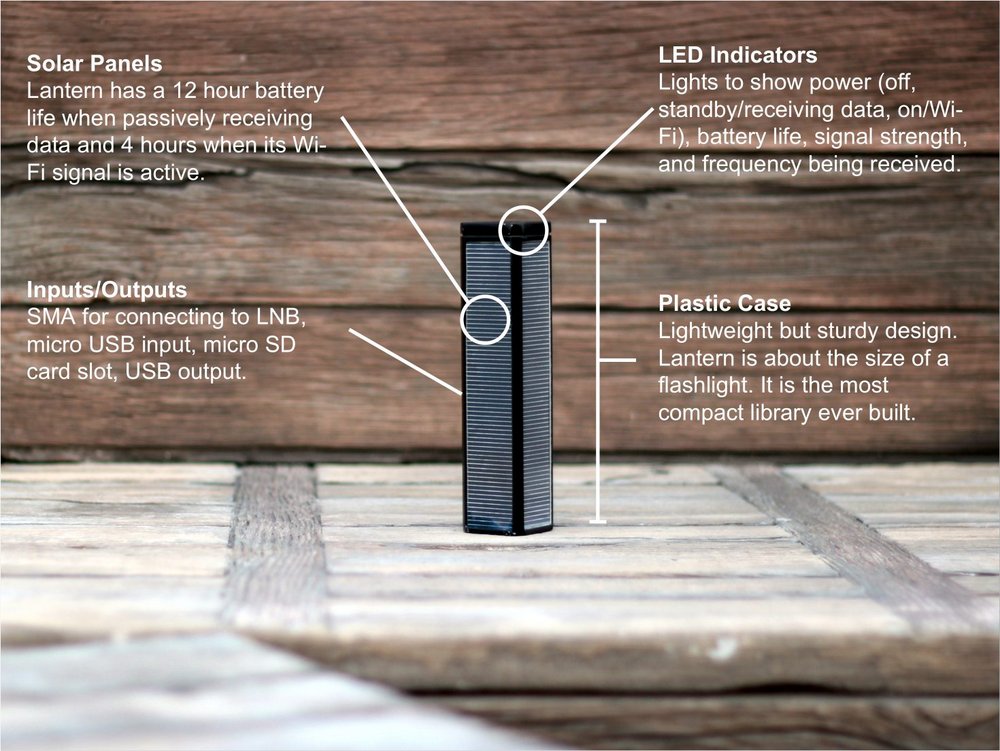Back in February 2014, I first published a post about Outernet: a company with a goal to provide free access to information across the globe through a network of satellites.
I was an early backer of their crowd-funded all-in-one self-powered satellite receiver and digital storage wifi hotspot device, the Lantern. (That’s a mouthful.) In short, the Lantern was to be a portable digital library that could be updated through their satellite network. Initially, excellent progress was made on the Lantern, then availability of the CPU halted production and backers started to feel shaky when progress updates were no longer being published.
I had one specific goal in mind for the Lantern: using it for my non-profit, Ears To Our World. I was so eager to put a system in one of our schools in Haiti, that I purchased their kit and tested it for the better part of a year hoping to learn the ropes prior to the Lantern’s release. The system seemed to work at first, but there were many glitches: the interface with tablets and mobile phones worked intermittently and the satellite link was prone to fail either due to hangups with the CPU or something else. I never deployed it because it was simply too unreliable. (Instead, we put resources into the RACHEL-PI system).
Then, Outernet dropped usage of their geosynchronous satellites which made my equipment pretty much useless. According to Outernet, they did so to invest in a faster satellite network.
Yesterday, I finally received an email update about the Lantern device and Outernet in general. I hope Outernet (now Othernet–-you’ll read about that below) keeps us better informed than they have in the past and I hope the Lantern device actually comes to fruition. I still think it’s a great idea, but my faith has been shaken.
(Source: Syed Karim at Othernet)
Broadcasting Khan Academy 24/7
Hello Backers,
Yes, we are still here. It’s been a long while since the last update, but that does not mean we have stopped–or even slowed–working on Lantern. We have been making progress, though it has been much, much slower than what everyone wants. Fortunately, we are in the final stage of development.
The last update described the new network technology we had developed. Our original goal was to broadcast 20 MB of content per day, which is what we were doing with our previous network. The new system is operating at 10-times that speed, which is a little over 20kbps and 200 MB of content per day. Some of the work we’ve been doing over the past few months is related to tripling our current download speeds. Our target is 60kbps, which results in over 600 MB per day. The size of the device will be similar to a standard flashlight.
At our current download speed of 20kbps, we are broadcasting both data and a 24/7 audio stream. I know many of you were interested in the educational applications that were highlighted during the campaign, which is why I’m very pleased to share that we are currently broadcasting the entirety of Khan Academy as a 24/7 audio stream. The Khan Academy library consists of over 900 separate lectures, which we’ve turned into a giant audio playlist. Now we just need to get Lanterns into everyone’s hands.
The next update will include a picture of our final antenna design. The antenna that is currently included in our DIY kit is 2-inches/5-cm across and the shape of a cone. We are trying to flatten the cone and also increase the size to about 4-inches/10-cm, which is what allows for greater download speeds. Since we are operating at microwave frequencies (12 GHz), both the design of the antenna and the parts to convert the high frequency to a lower one are pretty tricky. Microwave engineering is widely considered black magic, which is the main reason for the long break since the last update. We are close to turning the corner and are targeting the end of the year for our initial production run.
Unrelated to our technical work is our recent name change. We had been fighting a trademark issue for the past four years. We recently decided that it made more financial sense to change our name, rather than continue spending legal fees to defend our position. We are now Othernet (http://othernet.is). This name change does not mean we are going away, nor does it mean we are not delivering Lanterns. It’s just a legal hiccup.
Thanks for your patience and support while we get through the final stage of building what you all backed several years ago. I know it’s been a long time and we are making every possible effort to deliver something that exceeds everyone’s original expectations. Although it’s taking three times longer to develop and ship the product, what we now have will be ten-times more useful.


I was really excited about Outernet when they first surfaced years ago. Bought the required hardware (now defunct) to tinker with. It’s a great idea, but leadership has been lacking. There’s too much focus on the technical side, almost zero focus on the problem to solve and who they’re solving for. The latest announcement reflects that. Data rates and antenna shapes? How about talking through how these devices get into the hands of people that need them? How do they afford it? What type of content will benefit them? How does this platform remain sustainable? Are you building hardware that will last decades or will remote users be required to upgrade? (Which will be impossible for many.) I hope Othernet can answer those questions and ultimately succeed.